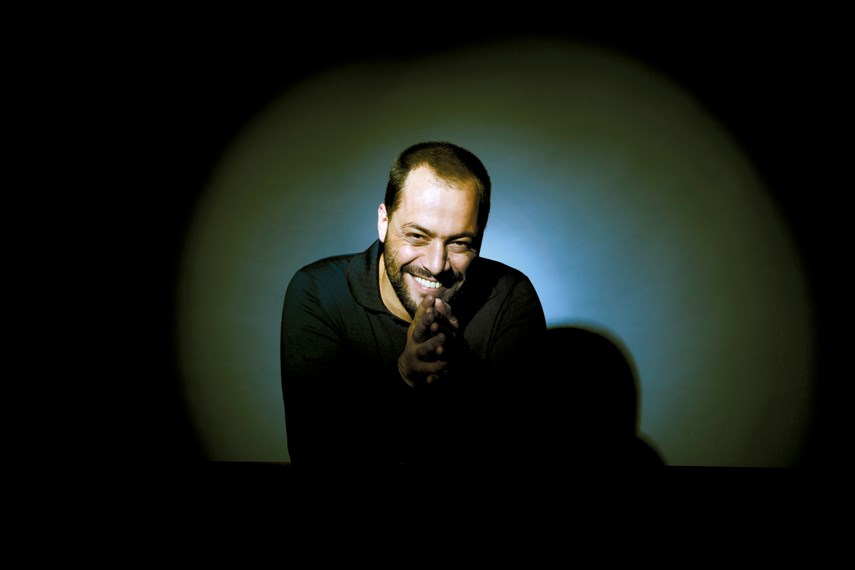Cap Global Roots presents Antonio Zambujo, March 25 at Kay Meek Centre. Tickets from $29 to $38 at kaymeek.com/antonio-zambujo or call the box office at 604-981-6335.
Contemplating the arrows of beauty and the slings of the heart, Marcel Proust once opined that the charms of a passing woman are generally directly related to the speed of her passing.
It’s a theme that features in fado singer Antonio Zambujo’s “Pica Do 7,” a tune morose in its joyfulness and joyful in its moroseness.
The pop-friendly sound centres on a Cupid-speared, poetic soul condemned to public transit for the sake of his love and infatuation: the tram’s ticket officer.
“What a sad fate, and what an unfortunate itinerary,” Zambujo sings.
Translated into English, the lyrics are melodramatic. But in Portuguese, a language that appears to an outsider to be rich in romance and impoverished in terms of ironic detachment, the poetry is sublime.
Zambujo has contemplated fado poetry since his boyhood.
Asked if his parents were musicians, he laughs.
“No, I’m the first one,” he says, speaking from Portugal.
Growing up in the country’s Alentejo region, Zambujo was surrounded by music. Every family reunion, each evening out with friends was marked with music.
“Everybody sings,” he says.
And in that environment Zambujo’s talent quickly became apparent.
His aunt prodded her talented nephew, showing him poems and played him the records of Amalia Rodrigues, a singer regarded as the Queen of Fado.
There was something about the music that compelled him, even as a boy, although he asserts that he doesn’t really know why.
Maybe it was the guitar. Maybe the technical complexity. Maybe it was what those singers seemed to know about love and fate and the habit truly beautiful people have of freezing your heart before disappearing around a corner and out of your life.
Compared to the music, school was uninspiring.
“Nothing that interested me,” he says.
There was a spell between the ages of 13 and 16 when he seemed dispossessed of any ambitions. It’s a time, he says, “Where you only see problems in your hand and you don’t like anything.”
It was during that period when he found the music again.
“That was the time when I felt that the music was what I wanted for my life.”
Despised by the country’s intellectuals, fado music was born in 19th century Lisbon and played in gardens, bullfights, taverns, on the streets and in the alleys, according to a history provided by the Museu Do Fado.
The music, often featuring, “a bully of a rough and hoarse voice with tattoos and skilled with a flick knife,” resonated with the poor people of Lisbon.
The museum’s account charts the evolution of fado, describing the way the 1926 military coup led to a series of constricting regulations that stripped much of the “improvised character” from the music.
That improvised character is apparent in Zambujo’s music.
The sense of a band completely attuned to one another can be heard on “Zorro.” As Zambujo sings about heroic fantasy the clarinet creeps behind his words. The guitar follows. The instruments share an enclosed space but never touch, each musician as courteous as the occupants in an elevator.
And while there aren’t melody-stretching solos there’s a metronome-defying playfulness that makes the songs feel alive.
The presence of the clarinet dates back to Zambujo’s childhood studying the instrument.
“It’s not me, it’s a much better musician than I am,” he says of his clarinetist. “I love the sound, maybe because it’s very familiar. … I still do my music thinking about the clarinet.”
The clarinet is often joined by a trumpet, Portuguese guitar, classic guitar, and a double bass.
His music has changed “and it’s still changing,” he says, citing influences including Chet Baker, Tom Waits and Spanish singer Silvia Perez Cruz, whom he calls: “one of the greatest singers alive.”
Asked if he enjoys touring, Zambujo replies with two words: “I love.”
“It’s two things that I love to do: to travel and to sing,” he explains. “As long as I have the musicians with me and the audience with me, I’m happy.”
It’s about seeing other cultures and hearing other kinds of music, but it’s also about sharing a bit of his hometown: Beja, Portugal.
When Rome and Lusitani established peace, Beja was Pax Julia. It’s been fought over and invaded and ruled by Carthaginians, Visigoths, Moors and Napoleon’s troops.
All that history is still embedded in the city.
“I felt this kind of rhythm,” Zambujo says. “It’s the roots.”



